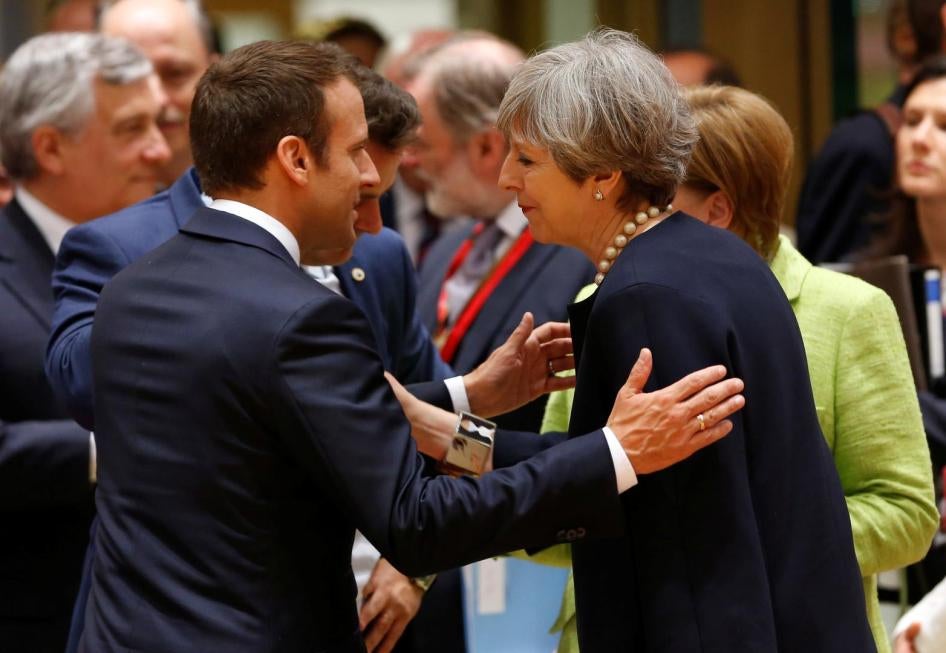It has been a bad few weeks for the populists and others who attack human rights. Emmanuel Macron trounced Marine Le Pen in the presidential elections, then his party collected a parliamentary majority of 350 seats against her National Front’s mere eight. These decisive victories represent a firm French “non” to Le Pen’s anti-Muslim politics of hate and intolerance.
Theresa May lost her parliamentary majority in the British elections despite a last-minute attempt to compensate for a lackluster campaign by cynically and falsely attacking human rights as an obstacle to fighting terrorism. Meanwhile, the populist UK Independence Party espoused anti-Muslim policies and saw its share of the vote fall from 12 percent to 2.
In some other parts of Europe, populists are struggling. The Five Star Movement in Italy has suffered a string of defeats in municipal elections, while the True Finns party in Finland has split in two after electing a new hardline leader with whom its mainstream partners in the country’s coalition government were unwilling to work.
In the United States as well, Donald Trump’s promise of mass deportations of migrants, his attacks on Barack Obama’s health care program, and his efforts to undermine democratic accountability and the rule of law have proven extremely unpopular.
Yet this is hardly a time for complacency. Populists remain in power in Hungary and Poland, and the European Union has been slow to challenge their dismantling of the checks and balances on executive authority and their flouting of the EU’s values of tolerance and openness. The far right could enter the governing coalition in Austria in elections later this year.
Looking beyond the West, populists of one form or another are in power in Turkey, Russia, Egypt, India, and the Philippines. Each leader, speaking in the name of “the people,” has displayed a willingness to trample on the rights of disfavored minorities and, often, even of mainstream critics.
What can be done to build on recent positive trends to advance the struggle against this dangerous form of populism?
Too often mainstream politicians have responded to a populist threat with mimicry
It helps to start by looking at the public concerns exploited by the populists. Populists excel at offering facile solutions to complex problems—typically scapegoating the most vulnerable—but that shouldn’t distract us from the very real grievances behind their surge.
The global economy and technological change have left many working people feeling left behind, with large numbers experiencing job insecurity or salary cuts. Clearly leaders who accepted the view that free trade would expand the economy to everyone’s benefit paid insufficient attention to how those economic rewards would be distributed and how dislocated workers would be affected. to the day's most important news.
A defense against populism also requires addressing immigration and integration. Strong factors are pulling people to Europe and the West: the flight from persecution, poverty and conflict, coupled with the West’s need for workers to supplement declining populations. Yet European countries have generally done a poor job of integrating Muslim and African immigrant communities, as epitomized by the tracts of hopelessness in the banlieues of Paris. Defending against populism requires greater attention to the obstacles to integration, including discrimination in housing, education, employment, and policing. It also requires franker discussion of the proper balance between immigration and integration, since a government’s failure to take the steps needed to enable integration is a sure recipe for public opposition to further immigration.
Perhaps most important, defending against populism requires standing up for democratic values. Too often mainstream politicians have responded to a populist threat with mimicry. That’s what Netherlands Prime Minister Mark Rutte did in his narrow March victory over populist Geert Wilders. The mimics hope to wean voters who are attracted by the populist message, but they end up legitimizing that message, so that even when populists fail to win office their ideas and policies gain traction.
Macron, by contrast, built his movement on a full-throttle defense of democratic principles, including their expression in the European Union. It remains to be seen how he actually governs—his endorsement of the legislative normalization of France’s state of emergency is a bad start—but at least his campaign’s rhetorical defense of the democratic values that the populists reject follows in the footsteps of Germany’s Angela Merkel and Canada’s Justin Trudeau.
We need more of that. The populists have shown that Western leaders (and human rights groups) have been wrong to assume that the public necessarily shares human rights values, that people always understand the importance of treating others the way they would want to be treated themselves. We now see that those values need regular tending. The recent elections in France show that this can be a winning political formula as well. We need more political leaders taking that path.








